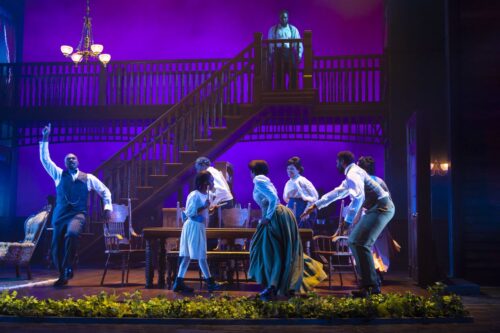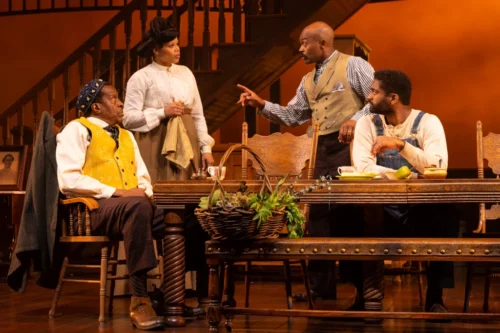JOE TURNER’S HERE TO STAY
Don’t let this gripping production of August Wilson’s Joe Turner’s Come and Gone come and go without seeing it yourself. This is classic American theater essential to our collective understanding of who we are, but that doesn’t mean you won’t find moments of pleasure in this adept production.
From the moment Maurice Parent and Shannon Lamb appear as Seth and Bertha, respectively, they have us laughing as they comment on the off-stage activities of Bynum, powerfully portrayed by Robert Cornelius. But Joe Turner is no comedy. This is a play of suffering and redemption through the power of community, most delightfully portrayed, perhaps, in the wonderful Juba dance scene near the end of Act I.
Bynum is the moral axis of the story, dispensing wisdom in the guise of magic. The audience attends to everything Bynum says, knowing he will steer the other characters in the right direction, even if his advice is not immediately accepted. As Bertha, Lamb defends Bynum to her impatient husband, and thus plays a pivotal role in holding together the boardinghouse community, short-lived though it is, through the crucial transitions of each of the characters who pass through its doors.
The beautifully rendered set (Arnel Sancianco) places us firmly in a 1911 boardinghouse in Pittsburgh even before the characters step onto the stage. Except for boardinghouse owners Seth and Bertha and their tenant Bynum, all the characters in this play will come and go, but it is the arrival of the mysterious and menacing Herald Loomis (James Milord) who moves the play from an intriguing collection of men and women thrown together by circumstance to a story with a powerful trajectory.
Again and again, Bynum sings the blues song “Joe Turner’s Come and Gone,” but for Herald Loomis, we eventually learn, Joe Turner has not come and gone. Joe Turner is the personification of slavery, but slavery has not ended in 1911. This is a world in which Black men are arbitrarily arrested and forced, as prisoners, to work without pay. Herald Loomis’s life has been disrupted in just this way, and he has come to Pittsburgh in search of the wife who left him during his incarceration. Milord is a menacing presence from the moment he knocks on the door of the boardinghouse, and the tension he brings continues to build even as Stewart Evan Smith, Dela Meskienyar, and Al-nisa Petty, as Jeremy, Molly, and Mattie, provide engaging subplots of coupling, uncoupling, and coupling again.
The harrowing culmination of the play portrays the power of the Black community to heal and restore in the face of pain. Director Lili-Anne Brown, who has produced many award-winning shows in Chicago and beyond, comments that this play offers a message to all of us as we grapple with the disruptions of the pandemic. “People lost their livelihoods, people lost their resolve,” Brown says, reflecting on the ways the lockdown affected the world of theater. “People moved all over the place, and you didn’t know where anyone was.” Brown used her experience of the pandemic and that of those around her as her entry point to this classic American play, imagining herself asking people, “What’s your journey been like? Where did you come from? How did you make it?”
And this is a community production. Ten of the thirteen cast members, as well as four understudies, the stage managers, the sound designer (Aubrey Dube), the dramaturg, and crew are locally based. Maurice Parent (Seth) is cofounder and artistic director, along with Dawn M. Simmons, of The Front Porch Arts Collective, a Black-led theatre ensemble in residence at the Huntington.
Appropriately, this is the first production in the newly renovated Huntington Theatre: between 1986 and 2005, August Wilson worked in residence at The Huntington on seven of the ten plays in his American Century Cycle. Joe Turner was the first of Wilson’s plays to be staged at the Huntington, and the renovated lobby of The Huntington is named for him. The Huntington was established in 1925 as the first civic playhouse in the country to be supported through community partnerships, and as dramaturg Sandy Alexandre notes, it is fitting that this play of spiritual redemption through the power of community marks the theater’s reopening.
photos by T. Charles Erikson
Joe Turner’s Come and Gone
Huntington Theatre Company
The Huntington Theatre, 264 Huntington Ave in Boston
ends on November 13, 2022
for tickets, call 617-266-0800 or visit Huntington





